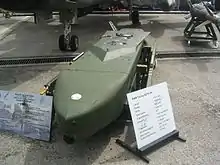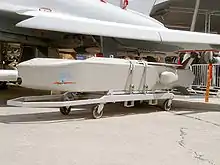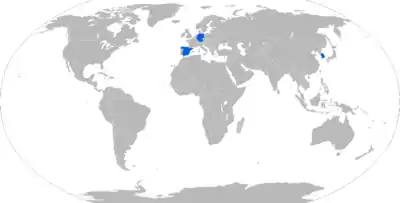KEPD 350
Taurus KEPD 350[lower-alpha 1] is a Swedish-German air-launched cruise missile, manufactured by Taurus Systems and used by Germany, Spain, and South Korea.[7] Taurus Systems GmbH is a partnership between MBDA Deutschland GmbH (formerly LFK) and Saab Bofors Dynamics.[8]
| TAURUS KEPD 350 | |
|---|---|
 A Taurus on display at the 2006 ILA air show | |
| Type | Long-range cruise missile |
| Place of origin | Germany and Sweden |
| Service history | |
| In service | 2005 |
| Used by | Germany, South Korea, Spain[1] |
| Production history | |
| Designer | Taurus Systems GmbH |
| Designed | 1998–2005 |
| Manufacturer | Taurus Systems GmbH MBDA |
| Unit cost | € 950,000 (US$1.09 million) |
| Specifications | |
| Mass | 1,400 kg (3,100 lb)[2] |
| Length | 5 m (16 ft 5 in) |
| Diameter | 1.015 m (40.0 in) |
| Warhead | 481 kg (1,060 lb)[3] Mephisto (Multi-Effect Penetrator HIghly Sophisticated and Target Optimised)[4] |
| Engine | Williams WJ38-15 turbofan |
| Wingspan | 2.065 m (6 ft 9.3 in) |
Operational range | >500 km (310 mi)[5] |
| Flight altitude | 40–50 m (130–160 ft) |
| Maximum speed | Mach 1 |
Guidance system | IBN (image-based navigation), INS (inertial navigation system), TRN (terrain-referenced navigation) and MIL-GPS (Global Positioning System) |
Launch platform | Integrated: Tornado, F/A-18, F-15K (Tested: Gripen, Typhoon)[6] |
Overview
The missile incorporates stealth technology and has an official range in excess of 500 km (300 mi).[9] Taurus is powered by a turbofan engine at Mach 1 and can be carried by Tornado, Eurofighter Typhoon, Gripen, F/A-18, and F-15K jets.
The double 500-kilogram (1,100 lb) warhead, called Mephisto (Multi-Effect Penetrator HIghly Sophisticated and Target Optimised),[4] features a precharge and initial penetrating charge to clear soil or enter HDBT (Hard and Deeply Buried Targets) hardened underground bunker, then a variable delay fuze to control detonation of the main warhead. The missile weighs about 1,400 kg (3,100 lb) and has a maximum body diameter of 1 metre (3.3 ft). Intended targets are hardened bunkers; command, control, and communications facilities; airfield and port facilities; AMS and ammunition storage; ships in port or at sea; area target attack and bridges.[10]
The missile also includes counter measures as a self-defence mechanism and electronic counter measures.
Mission planners program the missile with the target, air defence locations and planned ground path, then the missile uses a low terrain-hugging flight path guided by INS, IBN, TRN, and GPS to the proximity of the target, although it is capable of navigating over very long distances without GPS support.[11][5] Once there the missile commences a bunt (climb) manoeuvre to an altitude intended to achieve the best probability of target acquisition and penetration. During the cruise flight a high resolution thermographic camera (infrared homing) can support the navigation by using IBN and is also used for GPS-free target attack. The missile attempts to match a camera image with the planned 3D target model (DSMAC). If it cannot, it defaults to the other navigation systems, or, if there is a high risk of collateral damage, it will steer to a pre-designated crash point instead of risking an inaccurate attack with undesired consequences.
Taurus Systems GmbH has also proposed an anti-ship variant.[12]
Export
Spain's military bought 45 missiles. The integration of the Taurus in the Spanish Air Force service line has been certified by the successful completion of a dedicated test campaign in South Africa, carried out in May 2009.[13]
South Korea planned to order 200 missiles to integrate with their F-15K Slam Eagles after being refused Lockheed Martin's AGM-158 JASSM by Washington.[14] The Defense Acquisition Program Administration (DAPA) signed the deal in November 2013. Taurus Systems will open an office in Seoul to handle various acquisition tasks and support technology-transfer and joint development of the next cruise missile. The office was the company's first outside of Germany, and the KEPD 350 is the first European missile to be integrated onto a South Korean fighter aircraft.[15] In October 2016, South Korea announced it would acquire a further 90 Taurus missiles, in addition to the 170 previously ordered, in response to North Korean nuclear and missile provocations.[16] On 12 December 2016, the first 40 Taurus KEPD 350K missiles were delivered to the ROKAF,[17] which began deployment for combat use on 22 December 2016.[18]
Variants

The Taurus KEPD 350K variant for the ROKAF differs from the baseline model by being equipped with a Rockwell Collins GPS receiver with a Selective Availability Anti-Spoofing Module (SAASM) to prevent jamming.[19]
In October 2015, Taurus Systems revealed it was developing a smaller version of the Taurus missile, called the 350K-2, for use on light fighters, particularly the South Korean FA-50. Range would be reduced to 400 km (250 mi) and it would have a cruise speed of Mach 0.6–0.9.[20]
In December 2016, South Korea's Defense Acquisition Program Administration (DAPA) revealed it plans to start development on its own indigenous long-range air-to-ground missile in 2018, based on the Taurus cruise missile. The weapon will be mounted on the KAI KF-X fighter, to be developed by the mid-2020s.[21]
Operators

Current operators
 Germany
Germany- 600 ordered for the German Air Force's Panavia Tornados at a cost of €570 million.[22] Deliveries ended in December 2010.[12]
 Spain
Spain- 43 ordered for the Spanish Air Force's F/A-18s.[23] Deliveries ended in August 2010.[12] The program cost €60m.[24]
 South Korea
South Korea- 170 in service with 90 ordered, for use on the Republic of Korea Air Force's F-15K fighter jets.[25][26]
See also
- AGM-158 JASSM
- HOPE/HOSBO
- KD-88
- Ra'ad
- Ra'ad-II
- SOM (missile)
- Storm Shadow
- YJ-22
- YJ-12
- Wan Chien
- Joint Strike Missile
Notes
- Target Adaptive Unitary and Dispenser Robotic Ubiquity System/Kinetic Energy Penetrator and Destroyer.
References
- https://www.mbda-systems.com/product/taurus-kepd-350/
- "TAURUS KEPD 350E - The Modular Stand-Off Missile System" (PDF). Archived (PDF) from the original on July 29, 2020.
- Kepd 350 (PDF), DE: Taurus systems, archived from the original (PDF) on May 22, 2014.
- "First Taurus Cruise Missiles for Korea". C4Defence. Retrieved September 13, 2017.
- Taurus KEPD 350 the modular stand-off missile for precision strike (PDF), MBDA Deutschland GmbH, archived from the original (PDF) on November 15, 2012
- "Taurus KEPD 350 Modular stand-off missile system". Saab. Retrieved May 27, 2015.
- "Abstandslenkflugkörpersystem: Erste Taurus an Südkorea übergeben".
- "Gripen Multi-Role Fighter Aircraft, Sweden". Airforce technology. Projects. Retrieved July 17, 2007.
- "Kepd 350". DE: Taurus systems. Archived from the original on September 27, 2007. Retrieved September 3, 2007.
- TAURUS final (Motion picture). TAURUS systems GmbH. Archived from the original on July 29, 2020.
- "Kepd 350". Defence Update. Archived from the original on March 2, 2012. Retrieved May 6, 2008.
- Hoyle, Craig. "Germany receives last Taurus cruise missile" Flight global, December 14, 2010. Retrieved December 14, 2010.
- "El Ejército del Aire incrementa su capacidad operativa con la integración del misil Taurus en el F-18". Ejercito del aire (in Spanish). ES: MDE. Archived from the original on December 23, 2009. Retrieved June 15, 2009.
- "S. Korea to buy bunker busting missiles from Europe". Reuters. April 4, 2013. Retrieved April 7, 2013.
- "Taurus Systems to open Seoul office this week", The Korea Times, May 11, 2014.
- South Korea plans to buy more Taurus missiles after North Korea's new nuclear test - Airrecognition.com, 4 October 2016
- First batch of 40 Taurus KEPD 350K cruise missiles arrived in South Korea - Airrecognition.com, 13 December 2016
- South Korea starts deploying Taurus cruise missile for combat use - Airrecognition.com, 22 December 2016
- Jennings, Gareth (October 14, 2016). "South Korea begins receiving Taurus cruise missiles". Jane's Information Group. Retrieved December 13, 2016.
- South Korea plans to arm its FA-50 light combat fighters with new variant of the Taurus missile - Airrecognition.com, 23 October 2015
- South Korea plans to develop Taurus-based air-to-ground missile - Airrecognition.com, 14 December 2016
- "Taurus". EADS. Archived from the original on June 29, 2012. Retrieved September 11, 2007.
- Principales programas (in Spanish), Spain: MDE, archived from the original on October 20, 2008.
- "Evaluación de los Programas Especiales de Armamento (PEAs), Ministerio de Defensa" (PDF). Atenea (in Spanish). Madrid: Grupo Atenea. September 2011. Archived from the original (PDF) on October 24, 2013. Retrieved September 30, 2012.
- "(LEAD) S. Korea buys more Taurus missiles amid N.K. nuke threats". South Korea: Yonhap. October 4, 2016. Retrieved October 4, 2016.
- Mizokami, Kyle (July 10, 2017). "This Is How South Korea Plans to Stop a Nuclear Attack from North Korea". The National Interest. Retrieved January 5, 2019.
Further reading
- Taurus Systems GmbH, DE.
- TAURUSKEPD 350 – HigH precision STAnD-off (PDF), SAAB AB Dynamic, archived (PDF) from the original on May 28, 2015
- "TAURUS KEPD 350E". Archived from the original on November 22, 2019.
External links
 Media related to Taurus (missile) at Wikimedia Commons
Media related to Taurus (missile) at Wikimedia Commons